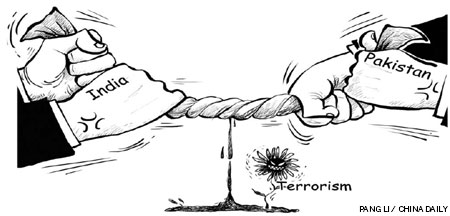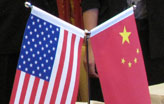Op-Ed Contributors
US' South Asia policy faulty
Updated: 2011-07-21 07:54
By Fu Xiaoqiang (China Daily)

Not surprisingly, counter-terrorism is one of the top issues on US Secretary of State Hillary Clinton's agenda during her visit to India. Though no extremist organization has claimed responsibility for last week's triple blasts in Mumbai, it reminded the Indian media of the 2008 Mumbai attack by terrorists who had slipped into India from Pakistan.
Last week's triple blasts in India's business capital may create new challenges for India and Pakistan, the long-time rivals in South Asia. Some Indian media outlets have hinted at the possible involvement of Islamic extremists from Pakistan in the latest attack on Mumbai.
The relations between the United States and Pakistan have suffered after the killing of al-Qaida chief Osama bin Laden, as was evident when the Barack Obama administration unveiled its new anti-terrorism strategy and suspended its military aid of $800 million to Islamabad.
Clinton said the US has made it clear to Pakistan that confronting terrorism in all forms is in Islamabad's interest. Indian External Affairs Minister S.M. Krishna responded by saying that terror sanctuaries in Pakistan need to be eliminated for regional peace and stability. And last week, Krishna welcomed Washington's decision to suspend the $800-million aid to Islamabad.
The US and India both are doing the opposite of what they should have done to help Pakistan fight terrorists. Their hard stance could provoke Pakistanis and help Islamic extremists strengthen their base in Pakistan.
Islamabad has greatly helped the fight against terrorists during Washington's 10-year-long "war on terror". But the US hasn't treated Pakistan as an equal partner. It even criticized Pakistan after bin Laden's killing. The convert US raid on bin Laden's hideout in Abbottabad, Pakistan, further affected the dysfunctional strategic mutual trust between the two countries.
The US' covert raid on bin Laden's hideout was just one example of the deteriorating relations between the US and Pakistan. One of the principal reasons why their ties began cooling down is the regular air strikes by US troops deployed in Afghanistan on terrorist targets on the Pakistani side of the Pakistan-Afghanistan border, which have left many civilian casualties and evoked public protests and indignation in Pakistan.
On its part, Washington has become increasingly unhappy with Islamabad's sluggish action against terrorists' strongholds in Waziristan in northwest Pakistan and fears that Pakistan's military intelligence has secret links with terrorist groups like the Taliban, Lashkar-e-Taiba and the Haqqani network.

Specials

Yao Ming retires
At just one-year old, Yao Qinlei will never get to see her famous father Yao Ming play on court.

China-US Governors Forum
The first China-US Governors Forum is held July 15 in the Salt Lake City, the United States.

My China story
Foreign readers are invited to share your China stories.